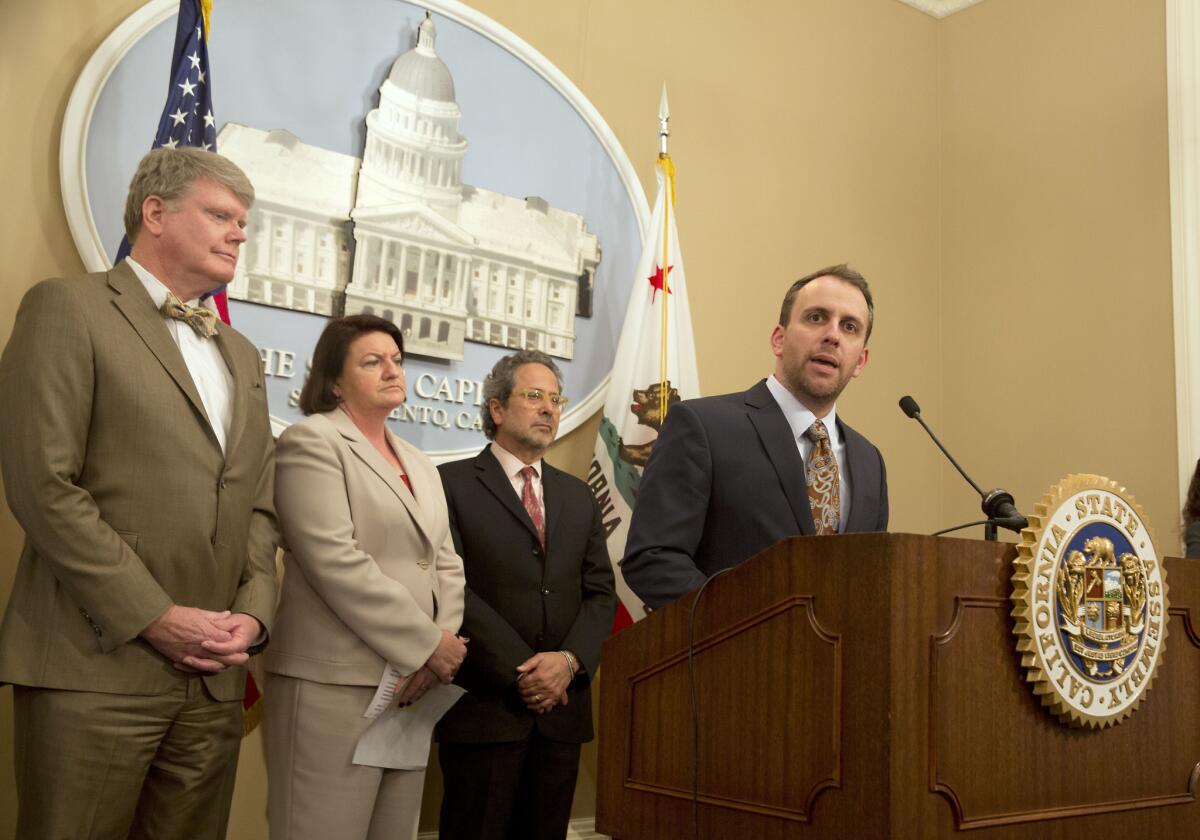Editorial: Bill to improve Coastal Commission transparency is a good start

Assemblyman Marc Levine (D-San Rafael), right, discusses the bill that he, Assemblyman Mark Stone (D-Scotts Valley), left, and Assembly Speaker Toni Atkins (D-San Diego) coauthored to require lobbyists to report their interactions with members of the California Coastal Commission.
- Share via
The California Coastal Commission’s controversial decision to dismiss its executive director this month could quickly yield a lasting dividend: a new law requiring better disclosure of the interplay between commission members and the people trying to influence them. That’s the silver lining in an otherwise dismal cloud hanging over the body appointed to preserve California’s coast.
The California Coastal Act requires commissioners to file a report whenever someone with business before the board communicates with them or requests a private meeting, and to divulge who asked for the meeting and what the person wanted. That requirement was later expanded to compel disclosure of not only who asked for the meeting, but everyone else who attended, plugging a hole that allowed interested parties to fill the meeting room while divulging the name only of the agent who sought the meeting.
Note the word “agent,” not “lobbyist.” Under the Coastal Act, people whose job is to persuade the commission to rule in favor of their clients — you know, lobbying — aren’t considered lobbyists. And that may not be unique to the Coastal Commission. Petitioners before other state commissions may also be exempt from registering as lobbyists and filing regular reports on their lobbying activities, though it’s unclear how many other regulatory commissions allow ex parte communications.
At the time they were adopted, the Coastal Commission’s ex parte disclosure rules were considered sufficient to establish a record of communications related to a specific proposal before the board. But time has proven the system to be woefully inadequate. The ex parte disclosure forms filled out by commissioners are linked online, although inconsistently, to each meeting’s agenda so the public can see who has contacted which commissioners about the issues scheduled to be heard there. But that only covers communications that occurred more than seven days before the meeting. For those closer to the date, the commissioners are supposed to divulge the contacts at the start of each agenda topic; filing a disclosure form is optional. The forms themselves are kept at the commission’s headquarters in San Francisco, with copies involving local projects filed at one of five regional offices, but nowhere are they compiled in a searchable database.
So if a member of the public wanted to see which person had the most ex parte communications with commission members on issues spread along the coast over a certain period, he or she would have to file a Freedom of Information Act request for copies of all the forms — an expensive and time-consuming undertaking. Or travel to San Francisco to sort through the paper forms. Or try to cull the information from online agendas, which only began including the disclosure forms in 2005. To make the record complete, the person would also have to sit through the meeting video recordings for any disclosures added there. That is absurdly out of date.
That opacity, in fact, fueled suspicions that development advocates quietly convinced the Coastal Commission to fire Charles Lester, its highly regarded executive director, on Feb. 10. Did the commissioners have cause to fire him based on his performance? The scant arguments they offered publicly weren’t persuasive. In the controversy’s wake, a group of Democratic Assembly members led by Speaker Toni Atkins (D-San Diego), Mark Stone (D-Monterey Bay) and Marc Levine (D-San Rafael) introduced a bill to add the Coastal Commission to lobbyist reporting requirements under the Political Reform Act of 1974. The change is so sensible, it should be applied to any commission or board subject to lobbying. Such a reporting regimen might not have saved Lester’s job, but at least the public would have a better sense of the forces at play.
And more needs to be done, including a re-assessment of whether the Coastal Commission should allow ex parte communications in the first place. But as long as these contacts occur, the lobbyists should be registered, and the Coastal Commission should maintain an online reporting system that is easily accessed and searched. A body charged with such an important duty as protecting California’s unrivaled coastline needs to conduct its business as openly as possible.
Follow the Opinion section on Twitter @latimesopinion and Facebook
More to Read
A cure for the common opinion
Get thought-provoking perspectives with our weekly newsletter.
You may occasionally receive promotional content from the Los Angeles Times.









